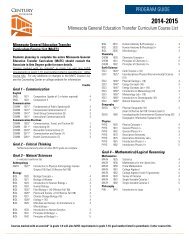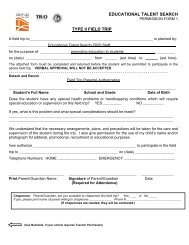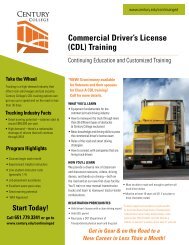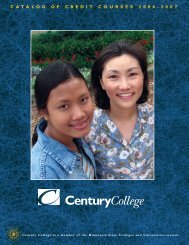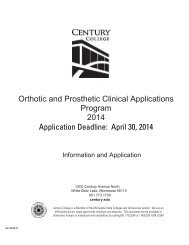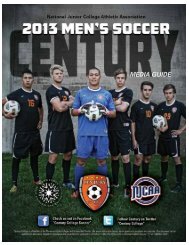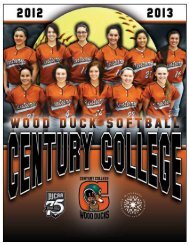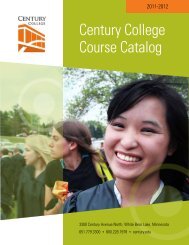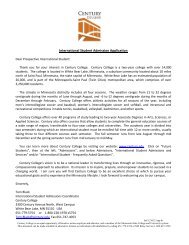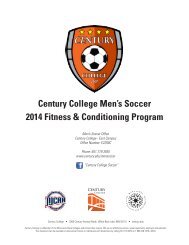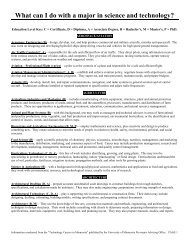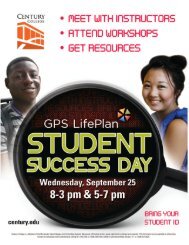2010-11 Course Catalog - Century College
2010-11 Course Catalog - Century College
2010-11 Course Catalog - Century College
You also want an ePaper? Increase the reach of your titles
YUMPU automatically turns print PDFs into web optimized ePapers that Google loves.
continues to develop all four language skills(listening comprehension, speaking, writingand reading). A two-hour weekly tape or CDlistening and laboratory work is required. Itintroduces French-speaking cultures to addmore awareness of the reach of the Frenchlanguage around the world.Prerequisite: FREN 10<strong>11</strong> or equivalent.Restriction: If students have completedfour years of high school French, consent ofinstructor is required. A test may be given todetermine appropriate level for placement.Independent StudyFREN 1790 1 - 3 CreditsThis course is an opportunity for an additional,in-depth study of an area of the French language.Prerequisite: Consent of instructor and dean.Completion of FREN 1012 or equivalent with agrade of B or above.Intermediate French IFREN 2021 5 CreditsMnTC: Goal 08This course is a comprehensive review of oraland written French employing a variety ofliterary and cultural texts. It strengthens theoral and aural skills developed in beginningFrench, and puts new emphasis on writtencomposition. It includes a study of historicaland contemporary issues facing Frenchspeakers,and engages students in discussingthe French-speaking world. A two-hour weeklytape or CDs listening, and laboratory work isrequired.Prerequisite: FREN 1012 or equivalent.Intermediate French IIFREN 2022 5 CreditsMnTC: Goal 08This course is a continuation of FREN 2021.It focuses on a comprehensive review of oraland written French employing a variety ofliterary and cultural texts. It puts a strongemphasis on writing, discussion, as well asresearch on cultural topics pertinent to Frenchspeakingcultures and current issues that theyface.Prerequisite: FREN 2021 or equivalent.Special TopicsFREN 2790 1 - 3 CreditsTopics of special interest which may vary.Prerequisite: Consent of instructor and dean.GeographyPhysical GeographyGEOG 1021 3 CreditsMnTC: Goals 03 & 10Students are introduced to the physical andenvironmental systems of the Earth, thedynamic processes that shape and characterizeour planet, and to the geography of the naturalworld. Processes of and scientific terminologyrelated to the Earth’s atmosphere (weatherand climate), hydrosphere (water on Earth),biosphere (geography of ecological systems),and lithosphere (materials and processes ofthe Earth’s crust) are studied. This course alsoexamines the powerful influences people andthe environment have upon each other (e.g.storms and other natural disasters; humanmodification of the Earth).Recommendation: Assessment scoreplacement in RDNG 1000 or above, orcompletion of RDNG 0090 with a grade of “C”or higher, or concurrent enrollment in RDNG0090.Human GeographyGEOG 1023 3 CreditsMnTC: Goals 05 & 08In this course students study and comparecharacteristics of human populations andsocieties. The processes underlying andexplaining the geographic patterns of humanactivities are also examined, as are real worldexamples from many disciplines and diverseworld regions. Study areas include humanpopulation dynamics (population growth anddistribution, migrations, settlement patterns,urbanization), cultural geography (worldlanguages and religions, folk and popularcultures), political and economic geography(political organization of the world, territorialissues, the global economy, and comparingmore and less developed world regions), andland use (agriculture and industry).Recommendation: Assessment scoreplacement in RDNG 1000 or above, orcompletion of RDNG 0090 with a grade of “C”or higher, or concurrent enrollment in RDNG0090.7 <strong>Course</strong> DescriptionsWorld Regional GeographyGEOG 1031 3 CreditsMnTC: Goals 05 & 08This course introduces students to worldregions including: U.S. and Canada, LatinAmerica, Europe, Russia and former Sovietstates, East and Southeast Asia, the Indiansubcontinent, the Middle East and NorthAfrica, Sub-Sahara Africa, and Oceania.Emphasis is on the environmental, cultural,political, and economic characteristics of eachregion, as well as differences and similaritiesfrom one region to another and how each isimpacted by globalization.Recommendation: Assessment scoreplacement in RDNG 1000 or above, orcompletion of RDNG 0090 with a grade of “C”or higher, or concurrent enrollment in RDNG0090.Minnesota GeographyGEOG 1041 3 CreditsMnTC: Goals 05 & 07In this course students explore thecharacteristics of Minnesota from ageographic perspective. Study areas includeMinnesota’s physical environment and naturalfeatures, population dynamics, migrations,settlement history and patterns, cultural,political, and economic characteristics,land use (e.g. agriculture and industry), andMinnesota’s regions.Recommendation: Assessment scoreplacement in RDNG 1000 or above, orcompletion of RDNG 0090 with a grade of “C”or higher, or concurrent enrollment in RDNG0090.Fundamentals of Geographic InformationSystems (GIS)GEOG 1051 3 CreditsIn this course, students are introduced tobasic concepts in Geographic InformationSystems (GIS) a computer-based set of tools,techniques, and concepts used in spatialanalysis. GIS is widely used in many fieldssuch as the environmental and social sciences.Typical activities in GIS include importing,organizing, and analyzing geographicinformation, and producing computerizedmaps. Topics covered include map designand data sources. Students will also haveopportunities to gain practical experienceworking with GIS software.651.779.3300 149




